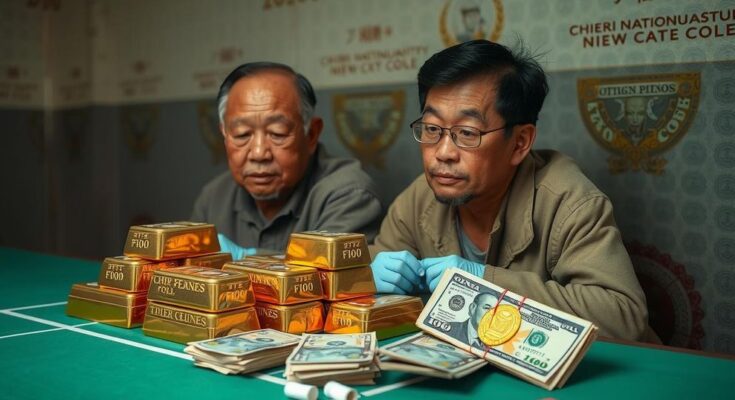Three Chinese nationals were arrested in eastern DR Congo with twelve gold bars and $800,000 in cash. The operation was discreet due to the earlier release of other Chinese miners involved in illegal activities. The region remains plagued by instability stemming from the exploitation of its rich mineral resources by foreign groups, with allegations of corruption complicating efforts for reform.
In the eastern region of the Democratic Republic of Congo, three Chinese nationals have been apprehended for possessing twelve gold bars and $800,000 in cash, which were discovered concealed under the vehicle seats. Jean Jacques Purusi, governor of South Kivu province, noted that the operation was shrouded in secrecy due to the earlier release of other Chinese individuals implicated in illegal gold mining. The region, rich in natural resources, has long faced exploitation from foreign entities, significantly contributing to ongoing instability for over three decades.
The governor highlighted that many mines in eastern DR Congo are under the control of militia groups, whose leaders profit through the sale of minerals to intermediaries. Purusi mentioned that certain precious metal traders maintain connections with influential figures in Kinshasa, necessitating discretion during the arrest operation, which was conducted based on a tip-off. Although he refrained from detailing the total amount of gold seized, earlier reports indicated that the previous group of arrested Chinese nationals had been released despite owing substantial taxes and fines to the government, which has raised concerns about the persistent corruption within the mineral sector.
Additionally, the continued conflict in the North Kivu province, exacerbated by a Rwanda-backed rebel group, casts a shadow over the region’s mineral-rich landscape. Recently, the Congolese government initiated legal action against Apple for allegedly utilizing “blood minerals,” claiming these resources are laundered through global supply chains, funding violence and militias while contributing to child labor and environmental damage. The Chinese embassy has yet to respond to the situation regarding the arrests.
The Democratic Republic of Congo is endowed with vast mineral wealth, including gold, diamonds, and batteries for mobile and electric vehicle production. This mineral wealth has been persistently exploited since colonial times, leading to a history of instability and conflict in the region. Militias control many mining operations, profiting from illicit mineral sales, while government efforts to address these issues remain undermined by corruption and international complicity. The Congolese government’s recent legal actions highlight the intertwining of global supply chains with local conflicts, particularly regarding the extraction and trade of conflict minerals.
In summary, the arrest of the three Chinese nationals in DR Congo underscores the ongoing issues of illegal mining operations and the exploitation of the country’s resources. Corruption and inadequate regulatory measures continue to hinder governmental efforts to achieve mineral sector reform. The situation is further complicated by regional conflicts and the international trade of conflict minerals, which perpetuates cycles of violence and human rights abuses. As the Congolese government strives to reclaim its mineral wealth, maintaining transparency and accountability will be crucial in overcoming these challenges.
Original Source: www.bbc.com




